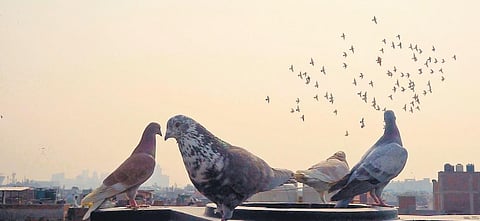

BENGALURU: With a growing pigeon population, health concerns associated with the birds are also on the rise. More so are cases of Hypersensitive Pneumonitis (HP) and other lung infections.
Ornithologists and urban planners term pigeons “pests” and admit that rising populations are a matter of concern for the city, which has lost its biodiversity and is also termed the ‘asthma capital’. Pulmonologists report cases of lung infections and HP. “Compared to Mumbai, which has seen over 20 deaths because of HP, Bengaluru is not badly affected. But it is a matter of concern as the culture of feeding and rearing pigeons is also rising in Bengaluru,” said Dr Sandeep HS, consultant pulmonologist, BGS Gleneagles Global Hospital, who previously worked in Mumbai.
Widespread public awareness is key to keeping HP at bay, he said. “On an average, 2-3 cases of HP are reported. While there are many causes for HP in the cases we treated, the patients were either pigeon feeders or were living in close proximity to pigeons,” he said.
Dr Sandeep also clarified that exposure to pigeons and their droppings once or twice may not lead to HP, but prolonged exposure does. “If you are feeding pigeons regularly which come to your home, the droppings are in and around your home, and inhaling it regularly causes problems. Pigeon feeding should be stopped and avoiding exposure is the best treatment,” he said.
Experts say there are no prescribed rules for handling pigeons, and a culture of feeding them prevails in many places. Doctors from the Indian Medical Association (IMA) Standing Committee for Anti-Microbial Resistance said a thorough investigation was being done on the cases reported. IMA officials said citizens must be cautious of large populations of pigeons around them, and that surroundings should be kept clean, especially where they leave droppings.
Dr Satyanarayan M, pulmonologist, Manipal Hospital, said with HP, cases of Psittacosis, caused by droppings of parrots, are also being reported.
But pigeon feeding groups in Bengaluru rubbish the claims as propaganda. Vasanthraj R, trustee of Sree Sankeshwara Parshwanath Jain Kaboota Dana Seva Samithi, said pigeons have been accepted as part of people’s daily life, and some could be affected by their droppings, so hygiene must be maintained.